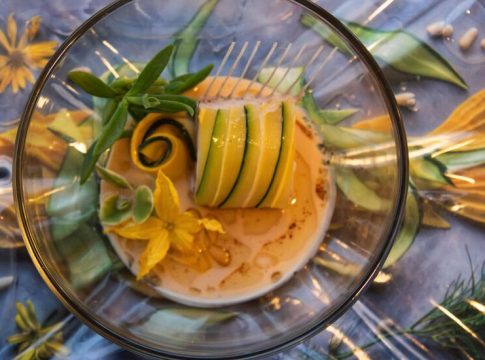AI Takes a Seat at the Culinary Table: A New Era for Restaurant Menus
In a groundbreaking venture, Chicago’s acclaimed restaurant Next is set to feature a unique nine-course menu crafted by a range of chefs—each contributing their own signature dish. Among these culinary talents is a fictional chef named Jill, a 33-year-old innovator from Wisconsin, whose career claims to have been influenced by culinary legends like Ferran Adrià, Jiro Ono, and Auguste Escoffier. The twist? Jill’s background and experiences were entirely generated by AI.
From Imagination to Reality
Chef Grant Achatz, co-owner of Next, relied on the generative capabilities of ChatGPT to create this culinary prodigy. By supplying the chatbot with Jill’s name, a fabricated work history, and family background, Achatz tasked the AI with generating dishes that reflect her fictional influences. This isn’t just a stunt; it represents a new frontier in how chefs might approach menu development.
“I want it to do as much as possible, short of actually preparing it,” Achatz said, highlighting a trend that could shift the culinary landscape.
AI’s Role in the Restaurant Industry
While many industries have quickly embraced AI for operational tasks—like inventory management and scheduling—the culinary world has been more cautious. However, Achatz’s initiative shows that chefs are beginning to explore the creative potential of AI in menu innovation. The technology, which has seen remarkable advancements in recent years, has begun to play an influential role in culinary artistry, paralleling its adoption in fields such as visual arts and music.
A New Tool for Creativity
The use of AI to generate creative content is not entirely new; it has taken off in the last decade, impacting everything from music composition to content creation. Yet, there’s a distinctive challenge in the culinary space where the tactile nature of cooking and personal flair are crucial.
-
Creative Collaboration: Many chefs may still hesitate to collaborate with AI, fearing it might dilute their unique style. Achatz’s experiment could pave the way for more culinary visionaries to embrace technology without losing their individual identities.
- Future Implications: If AI can help chefs dream up innovative dishes, it could lead to a revolution in how we perceive dining experiences. Imagine if AI could also analyze consumer preferences, seasonality of ingredients, and cultural trends to suggest entirely new combinations.
Conclusion: Culinary AI on the Horizon
As AI continues to evolve, its applications in the kitchen may hold significant promise for both established chefs and newcomers alike. The integration of such technology could redefine culinary creativity, making restaurant menus as dynamic and diverse as the chefs who craft them. Whether this leads to entirely new culinary genres or simply enhances existing ones, the impact of AI in fine dining seems poised to leave a lasting imprint on the culinary arts.
In an era where the lines between artificial and authentic are increasingly blurred, one thing is clear: gourmet innovation is set for exciting, and perhaps unprecedented, transformations.

Writes about personal finance, side hustles, gadgets, and tech innovation.
Bio: Priya specializes in making complex financial and tech topics easy to digest, with experience in fintech and consumer reviews.

